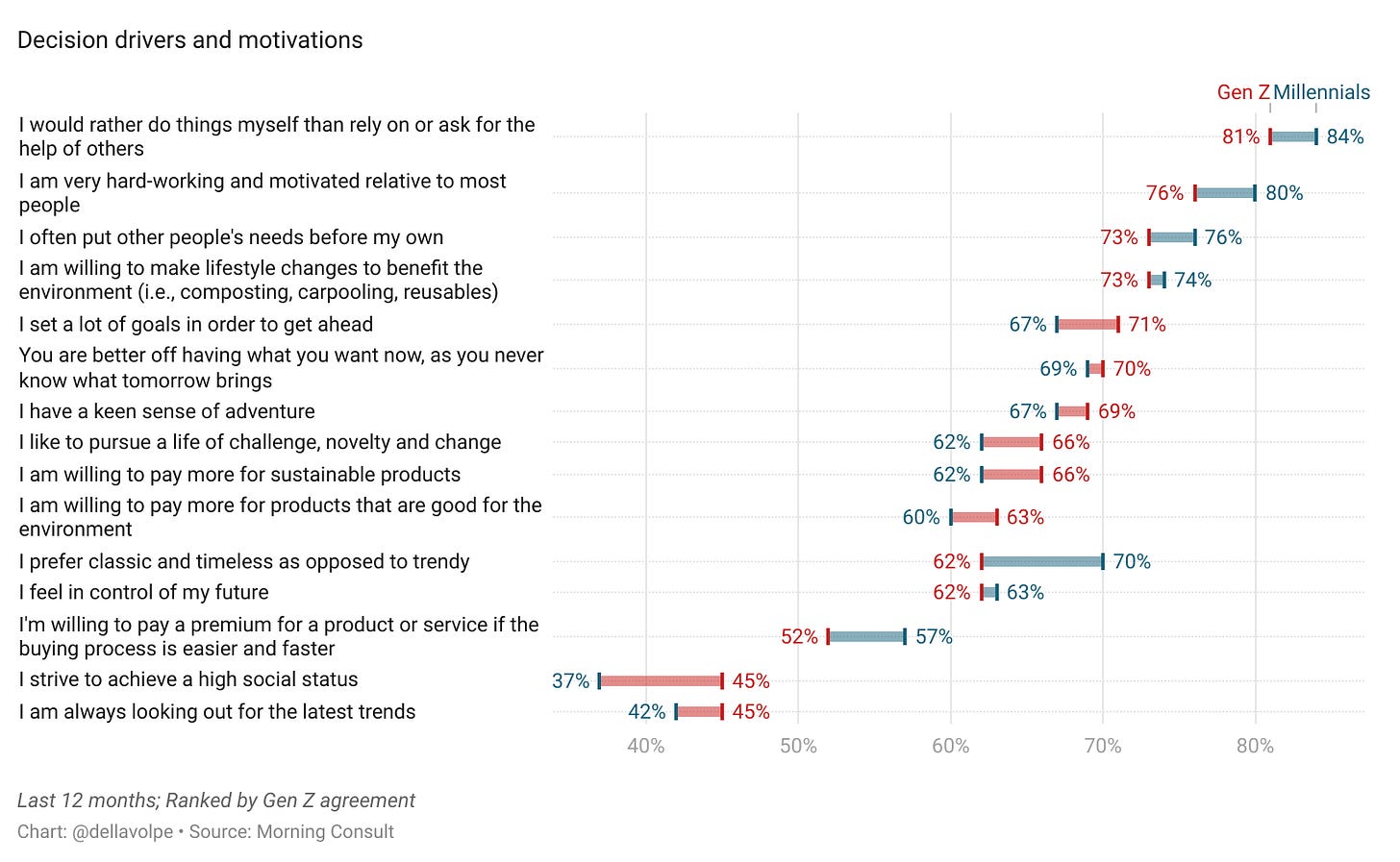Gen Z vs. Millennials: Revealing Pride Month brand preferences and media fixations
Exploring the Generation Gap in consumer loyalty and media consumption habits
The Backdrop
One of the questions I am most often asked is how the attitudes and habits of Gen Z differ from millennials.
On many political issues, their differences are relatively minor (and I will write more about this in the days and weeks ahead). The same holds for many, but not all, lifestyle attitudes fundamental to how younger Americans live. The most significant differences are in technology and media habits and how they consume news and entertainment. Understanding this rapidly changing and constantly evolving landscape is essential for leaders across industries seeking to engage the evolving generation and future stewards of the American economy.
My Big Three Takeaways
I spent the last few days immersed in hundreds of thousands of interviews on dozens of topics conducted over several years by Morning Consult, and before I delve more deeply into the subgroups of subgroups — here are the toplines on how two generations of young adults approach decision making, brands caught in the Pride Month “backlash,” social media, news, and entertainment.
Note: The differences between Gen Z and millennials expand greatly from takeaway to takeaway.
#1: Gen Z and millennials largely united in decision-making, goals, and motivations
Let’s start with what Gen Z and millennials have in common. Based on more than 200,000 interviews that Morning Consult conducted with these two generations over the last year, we found narrow differences between the way Gen Z and millennials approach decision-making in their lives. At least seven-in-ten members of both generations:
Would rather do things themselves rather than ask for help
Believe they work harder than most people
Often put the needs of others ahead of their own
Are willing to make lifestyle changes to benefit society
Contrary to what many might think, less than half of both generations say they’re out looking for the latest trends, as more than 60% “prefer classic and timeless as opposed to trendy.” One of the most significant differences (although minor relative to views towards technology and brands) is how each generation thinks about their role in society. At 45%, Gen Z is more likely to be interested in achieving a high social status compared to millennials (37%), at least at this stage in their lives.
#2: Bud Light's Gen Z woes
Looking at overall favorability in the last month of six brands caught up in various ways in the right-wing Pride Month “backlash” shows:
Generational alignment and high favorability for both Target and Walmart;
Minor, but notable, seven-point Gen Z preference for Chick-fil-A;
Millennials’ connection to Kohl’s is stronger than Gen Z's right now.
But, the most compelling data in the above chart is how poorly Bud Light performs among younger Americans, especially Gen Z. Walmart’s favorability among this crucial demographic is 3x that of Bud Light (73% to 24%) in early June.
It is nearly certain that the Bud Light team was aware of this when they made the decision to align with Dylan Mulvaney and support the transgender community; the brand has had a relevancy problem with younger Americans for years. Favorable ratings of the brand started below 50% when Zoomers turned 18, and it’s only gotten worse from there. In the three months preceding the “Bud Lash,” Gen Z favorability was hovering in the low 30s, a slight improvement from the last few quarters of 2022.
I am not going to speculate about who did what and why over at Bud Light, but if there was ever a case for knowing your customer and staying in constant communication through the rigorous use of social science with them and other emerging groups — it is this.
#3: Generation Z's news, streaming, and social media diet sets them apart from millennials
Engaging with Gen Z is more than employing a reasonable TikTok-influencer strategy. Yes, having a TikTok plan is essential for most brands, but building trust and confidence with Gen Z means understanding the technology they call their own. Understanding how their media habits differ from older generations is fundamental, not just for media targeting — but this kind of information also helps build trust and develop relationships inside and outside the workspace.
Keep reading with a 7-day free trial
Subscribe to JDV on Gen Z to keep reading this post and get 7 days of free access to the full post archives.






